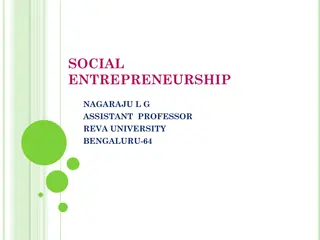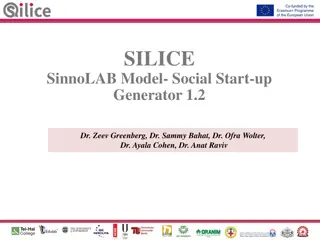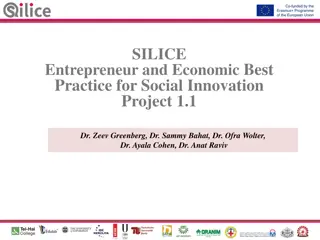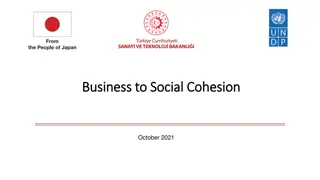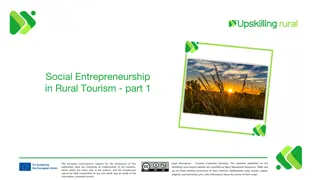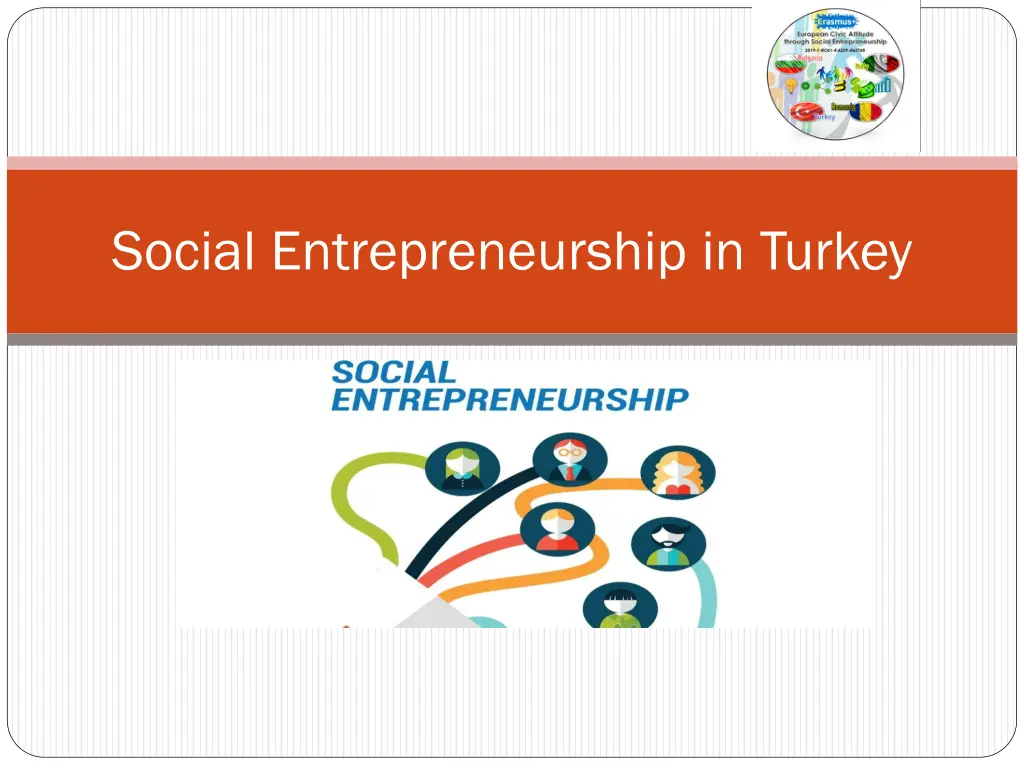
Social Entrepreneurship Landscape in Turkey
Discover the landscape of social entrepreneurship in Turkey where around 9,000 social enterprises thrive, predominantly in Istanbul, Ankara, and Izmir. Learn about the characteristics of these enterprises, the challenges they face, and how the ecosystem is evolving to support their growth and impact.
Download Presentation

Please find below an Image/Link to download the presentation.
The content on the website is provided AS IS for your information and personal use only. It may not be sold, licensed, or shared on other websites without obtaining consent from the author. If you encounter any issues during the download, it is possible that the publisher has removed the file from their server.
You are allowed to download the files provided on this website for personal or commercial use, subject to the condition that they are used lawfully. All files are the property of their respective owners.
The content on the website is provided AS IS for your information and personal use only. It may not be sold, licensed, or shared on other websites without obtaining consent from the author.
E N D
Presentation Transcript
There are around 9,000 social enterprises in Turkey Most of them are located in stanbul, Ankara and zmir. 47% are YOUNG 83% are HIGHLY EDUCATED 55% areWOMEN Women s access to the full range of sources of external funding and finance is lower than men. Most social enterprises are young organisations established after 2015.
Social enterprise is a comparatively new phenomenon in Turkey with growing interest from academics, civil society actors, policymakers and practitioners. This is also a refl ection of current global trends.Social impact and sustainability is gaining attention worldwide. Digital information and new technologies are enabling people to come together in relation to pressing social and environmental issues, such as global warming and immigration.
In line with global trends,social enterprises inTurkey are gaining momentum.The increasing number of social enterprises founded each year creates a rapidly changing landscape. Despite this increased interest in social enterprise, the enabling mechanisms for developing an effective social enterprise ecosystem are very limited in Turkey. Incubation, acceleration, co-working or lab facilities for social enterprises are limited.
Since 2016, the social enterprise ecosystem in Turkey has been developing, yet sectors and actors are still operating in isolation. Interaction between actors (such as public bodies, local administrations, private bodies, universities and citizens) continues to be mostly spontaneous and event-based. On the positive side, greater emphasis has been placed on coordination and collaboration by major ecosystem actors. At the same time, prominent universities, technology incubators, civil society organisations, international actors and policy networks offer great potential to create a more functional social enterprise ecosystem in Turkey, and interest is growing.
It is challenging to calculate the number of social enterprises in Turkey, since there is no legal status for social enterprises, and there is an absence of relevant data. Nevertheless, a rough estimate has been made to better understand the size of the sector. This estimate is based on not statistically robust samples, but speculative extrapolation. To form this estimate, organisations that met social enterprise characteristics within the NGO, co-operative and micro, small and medium-sized enterprise (MSME) communities were examined.
Main Sectors in Turkey: GDP 2010 - 2017 ($ billions) 771.9 - 851.1 Agriculture 2010 - 2017 (%) 9 - 6 Industry 2010 - 2017 (%) 25 - 29 Manufacturing 2010 - 2017 (%) 15 - 18 Services 2010-2017 (%) 54.3 - 53.3
The Directorate General of Co-operatives in the Ministry ofTrade is carrying out awarenessraising activities for social co-operatives, pursuing a policy focus described in terms of the social and solidarity economy and social entrepreneurship. The Directorate for EUAffairs of the Ministry of ForeignAffairs is promoting a social entrepreneurship agenda within the framework of the Civil Society Sector Programme under EU IPA funds,co-ordinating the EaSI Programme and is representingTurkey at the Groupe d experts de la Commission sur l entrepreneuriat social Expert Group on Social Economy and Social Enterprises.
The Ministry of ForeignAffairs is also supporting the SDG agenda via an accelerator programme, together with the United Nations Development Programme (UNDP). The Ministry of Industry andTechnology is channelling fi nancial support for social innovation through the Competitive Sectors Programme under IPA funds, and is carrying out activities via regional developments.
TUBTAK has a social entrepreneurship segment under its entrepreneurship and innovation competitions for university students and is engaged in policy dialogue meetings with ecosystem actors. TheTurkish Small and Medium Enterprises Development Organisation (KOSGEB) is engaged in policy dialogue meetings with ecosystem actors.
The Ministry of Family, Labour and Social Services is partnering in EU-funded projects in the field and participates in policy dialogue meetings organised by ecosystem actors. The Ministry of Development,before it was abolished in July 2018,had social entrepreneurship on its agenda.
At the regional policy level,some regional development agencies16 inTurkey are also engaged in supporting social enterprise.RDAs are located in the regions;they are familiar with local and regional needs and are connected with numerous stakeholders from different sectors. They are also comparatively more agile and dynamic in their governance structure than national bodies.Some RDAs17 have provided fi nancial support or have sub-granted EU funds, while others18 are preparing to actively engage with the sector.
Social enterprise leadership Age Social enterprise leaders in Turkey are young. Nearly 38 percent of respondents reported that the age of the person managing their social enterprise is between 25 and 34, and 9.3 per cent are aged between 18 and 24. This means almost half (47.28 per cent) of social enterprise leaders are under 35, compared to 21.4 per cent amongst businesses more widely in 201726.
Gender Most social enterprises in Turkey are led by women,with 55 per cent of the leaders or managers of respondent social enterprises being women. The percentage of female managers in younger enterprises that started their operation before 2015 (57.4 per cent) is higher compared to the percentage in more established enterprises (50.9 per cent). In comparison, the percentage of women managers in commercial businesses is 18.9 per cent according to 2017 data27. Women s participation in civil society also remains low 10.4 per cent of civil society organisation members are women, and only 14 per cent of leaders in civil society organisations are women.
Education level The education level of social enterprise managers or founders is relatively high 84 per cent of the managers or founders of respondent enterprises are at least vocational school/university graduates. This fi gure is much higher compared to commercial enterprises inTurkey,which was 27.7 per cent29 in 2017. Moreover, 20 per cent of the managers or founders of respondent enterprises have either a master s or a PhD degree. The leadership education level is even higher in more established enterprises 88.14 per cent of leaders at enterprises that started their operations in or before 2015 have an undergraduate degree or higher. Female managers are more likely to have graduate degrees 40.85 per cent of the female managers in the sample are either graduate school students or have a graduate degree.
Legal status The legal status of social enterprises in Turkey form a broad spectrum, as social enterprises choose one or more of the available legal forms, depending on what best suits their needs. Turkish law does not provide for a separate legal entity for social enterprises.Many social enterprises inTurkey (28.7 per cent) are registered as co-operatives and limited liability companies and sole traders (both 18.6 per cent). A signifi cant number (14 per cent) have chosen to establish themselves as associations,whereas only 3.1 per cent have opted to be a foundation. Social enterprises formed as corporations account for 13.2 percent of participants. A total of 12 of the 129 respondent enterprises (9.3 per cent) have chosen a hybrid model,adopting a combination of legal forms. A total of 10 per cent of social enterprises in the sample do not have a formal legal status
Although social enterprises are commonly associated with certain industries, such as social care, they actually work in a diverse range of sectors inTurkey. Education is the most frequent, accounting for 21.71 per cent of respondent organisations, followed by manufacturing and production (12.4 per cent) and creative industries (11.63 per cent). Agriculture and farming account for (10.85 per cent), while 6.2 per cent work on recycling and environmental awareness and 5.43 percent work on employment and skills development. A deeper analysis on female leadership across different sectors did not show that female leadership is driven by any particular sectors.
When asked about financing constraints, a strong majority (76 per cent) of respondents reported that they face barriers to fi nance, irrespective of gender. The key financial challenges faced by these social enterprises are: scarcity of people or institutions who invest in social enterprise lack of shared language amongst fi nance providers and social enterprises difficulties in accessing funds/donations/crowdfunding high profit expectations of investors difficulty in accessing international fi nancial sources. More than 80 per cent of social enterprises believe that each of these challenges are either important or very important.
Social enterprises take a range of legal forms.Within the current legal framework,they can choose one or more of the available legal forms,depending on which best suits their needs.Almost two-thirds of social enterprises are organised as companies and co-operatives,while associations and foundations account for 17.1 per cent. Social enterprise and social innovation are closely linked.Social enterprises are often innovative,and it is important to how they identify themselves. Social entrepreneurs often develop state-of-theart ideas,models,products and services.Policies aimed at developing innovation should include social enterprises as target groups as well.


